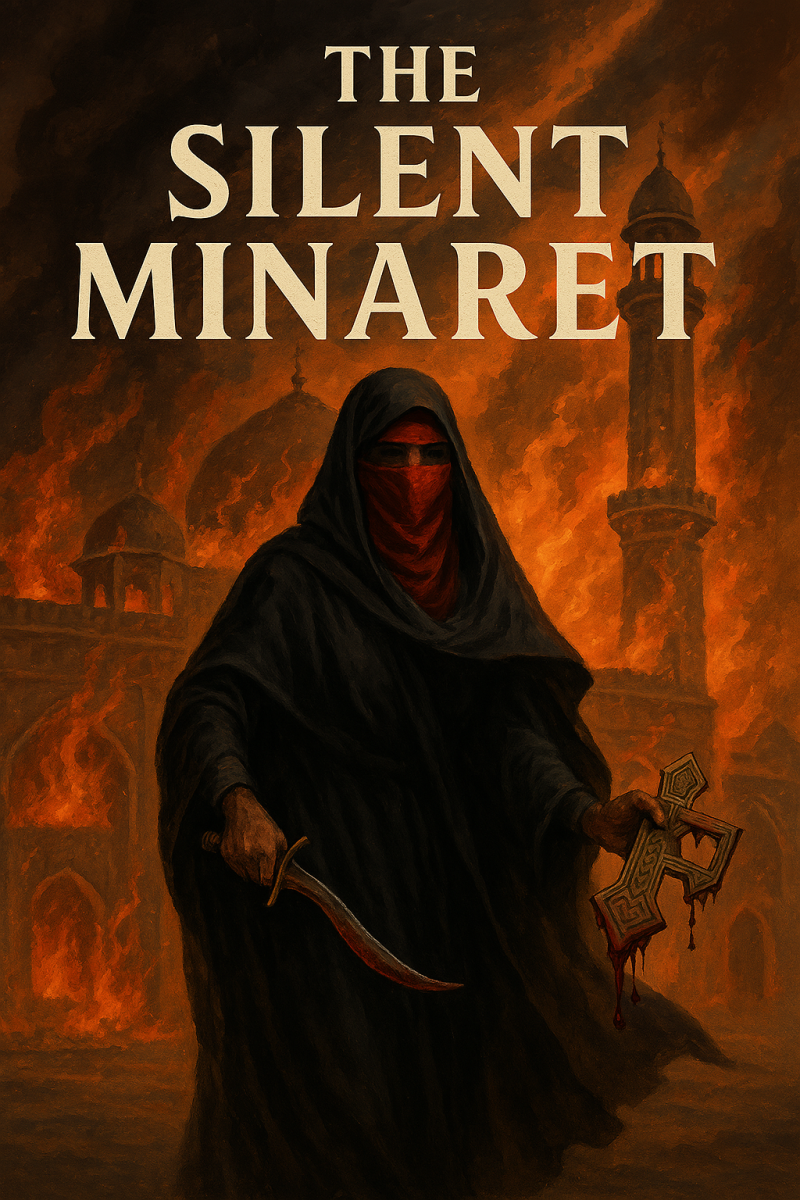
The skies above Nimruzar were stained with smoke and ash, the desert winds carrying the scent of blood and burning banners. Once, the palace of Sarmid Shah stood tall, its domes gleaming with the sun’s kiss. Now, it loomed like a silent tomb, its marble steps drenched in the blood of its own.
Sarmid, the Lion of Nimruzar, knelt in chains. His crown lay shattered beside him, and blood trickled from his temple to the earth, mingling with the dust. His once-gleaming armor had been stripped away, and his back bore the lashes of humiliation. Yet even in defeat, his spine did not bend. Not truly.
Before him stood Bahram, the general he had once called brother. The man he had raised to glory, entrusted with the eastern gates. Bahram’s sword was red with the blood of loyal men. His eyes held no sorrow.
“You should have yielded,” Bahram said quietly, almost regretfully.
Sarmid coughed, a rough sound that splattered red onto the sand. His voice was hoarse, dry like a desert wind. “Is… is my wife still alive?”
Bahram hesitated, just briefly. Then he nodded.
And Sarmid smiled.
“You fools,” he whispered.
Then he laughed. It began as a choked, wheezing sound, but grew into something deeper, louder—mad, glorious laughter that echoed across the fallen courtyard like a war drum.
The enemy soldiers stiffened. The sound unnerved them—not because it was defiant, but because it was prophetic. Behind the walls of the ruined palace, explosions sounded like thunder cracking the heavens.
Bahram turned sharply as smoke bloomed from the west wing of the fortress. The screams of his men rose like a storm tide.
“What did you do?” he hissed.
Sarmid’s face darkened with fury. “I didn’t do anything,” he said. “She did.”
Through the choking smoke and flame, a figure emerged—cloaked in obsidian, face veiled in crimson silk. Her steps were deliberate, silent as death. In one hand she carried a curved dagger soaked in blood; in the other, the severed sigil of Bahram’s house.
It was Queen Anahita.
The soldiers shouted. Some charged. Others hesitated, shaken by the stories whispered in Nimruzar’s alleys—the Queen who trained with assassins beneath the moonlight, the blade-dancer of Mehrangarh, the woman who once slit the throat of a man who insulted her husband in court.
Anahita moved like the wind: silent, swift, and deadly. Her blade sang across necks and hearts, her feet barely touching the ground. She weaved through the enemy like a vengeful spirit, untouchable and merciless.
Each death was an act of devotion.
Sarmid, still on his knees, watched in silence. Blood dripped down his face, but tears lined his eyes. He had known she would come. He had counted on it.
A soldier lunged from behind her, and with a single spin, Anahita drove her dagger upward beneath his chin. She did not look back. Her eyes were locked on Bahram now.
He barked orders. Arrows flew. She disappeared into smoke, then reappeared behind them. A volley of fire lit the courtyard like a second sun—and when it cleared, half his men were dead.
Some tried to run.
None made it far.
When Anahita reached her husband, she knelt beside him. Their foreheads touched. His blood smeared her veil. For a moment, there was silence.
“I’m sorry,” he whispered.
“I’m not,” she said, cutting his chains with a hidden blade. “I told you—if they came for you, I would come for them.”
He rose shakily, leaning into her. “You should have run.”
Her eyes, lined with kohl and war, did not flinch. “You are my country.”
Together they walked through the dead.
At the far end of the courtyard, one man still lived. Hands raised. Armor bloodied, but intact. His face was twisted in anguish.
Ardeshir.
Sarmid’s old friend. His closest advisor. The man who dined with their children. Who kissed their hands in greeting. Who swore loyalty until his dying breath.
And who, now, had betrayed them both.
Anahita approached him slowly. Her blade dragged behind her, leaving a trail in the dust. Her veil fluttered as the wind returned, carrying the scent of justice.
Ardeshir dropped to his knees. “Anahita. Please.”
“You called me sister,” she said coldly. “You trained beside me. I told you my fears.”
“I did it for the realm,” he gasped. “He—he was going to destroy everything—”
“You destroyed it.”
She stood before him now, her dagger raised, the metal still dripping with Bahram’s blood. The courtyard was silent. Not even the wind dared speak.
Sarmid said nothing. He did not stop her.
Anahita pressed the dagger to Ardeshir’s throat.
And she waited.
Her eyes flicked to her husband.
He looked at her, broken and bleeding—but alive.
Her hand trembled.
The man she once trusted began to cry.
And the blade held still at his neck.
The Queen of Nimruzar stood between vengeance and mercy, her body taut with fury, her soul burning with grief.
But she did not yet strike.
Not yet.
Add comment
Comments